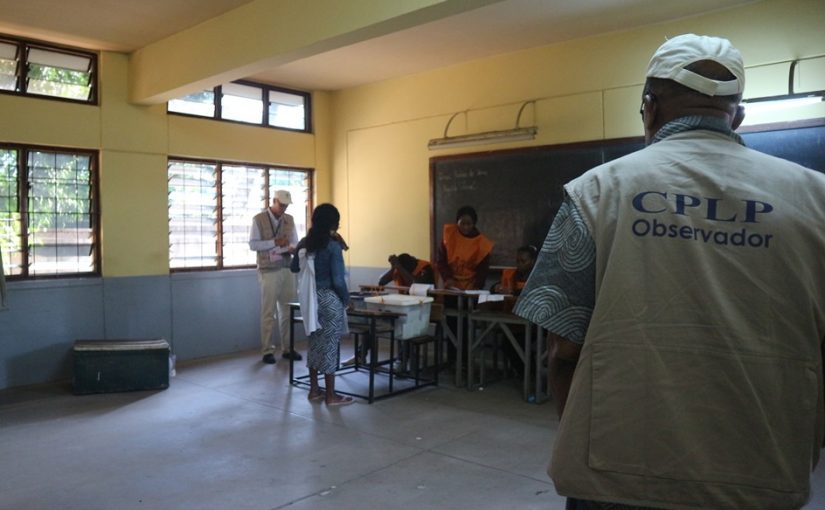EU Military Assistance Mission helps build capacity for over 500 troops in first year of operations ...
Mozambique Elections: CPLP EOM questions election transparency, credibility

File photo: @_CPLP/X
The CPLP Electoral Observation Mission to Mozambique witnessed incorrect vote counting and evidence of voters voting several times, “negatively conditioning the transparency and credibility of the process”, according to the final report to which Lusa has had access.
In view of the “pre-election controversies” and the “findings” it presents, the Electoral Observation Mission (EOM) of the Community of Portuguese Speaking Countries (CPLP) considers that the general elections of October 9 in Mozambique “took place in a context of distrust regarding the electoral system”.
Led by Portugal’s former Minister of Foreign Affairs João Gomes Cravinho, the CPLP-EOM also highlights that, in view of the pre-election controversies, “the starting point was not favourable for the credibility of the electoral process”.
Among the pre-election controversies, the EOM lists the contestation that the 2023 local elections triggered, with the rectification by the Constitutional Council (CC) – which functions as an electoral court – of the distribution of victories and the repetition of the scrutiny in several municipalities and polling stations in relation to the results announced at the time by the National Elections Commission. “The detailed reasoning of the CNE in its initial attribution of election results and of the CC in its subsequent decisions, as well as the detailed breakdown of the electoral numbers for each polling station in each municipality are not fully known, leading to the final results [of the 2023 local elections] having been shrouded in controversy,” the report reads.
As for the findings on the 9 October vote, the CPLP-EOM states that it recorded “at the various polling stations where it was present”, “uneven compliance” with the provisions of electoral legislation “namely with regard to the reading of the sequential number on the ballot paper; the existence of blank ballot papers in a greater number than the number of voters registered at the polling station; the counting of the number of ballots registered in the electoral registers; the reconciliation of the number of ballots in the electoral register with the number of votes cast in the ballot box; the locking of the voter list; and the posting of the minutes in a visible place in the polling station”.
CPLP electoral observers also witnessed “several cases of erroneous vote counting, namely: ballot papers folded in an overlapping manner and counted as valid, indicating that the same person had voted more than once”, and also “many dozens of votes with an identical mark, indicating that the marking on the ballot paper had been made by the same person”.
The “excessive delay” in counting the votes and the different procedures used by polling station presidents meant that “many hours after the closing of the polls there were no results available, negatively affecting the perception of transparency and, consequently, the credibility of the process”.
The announcement of the final results by the CNE on 24 October was the result of a majority decision by its members and was not made by consensus “which contributes to a feeling of uncertainty about the reliability of the results”, highlights the CPLP-EOM, noting that six of the 13 commissioners contested the CNE’s final decision in their vote declaration.
Recognizing that it is now up to the CC to have “the final say” on the results of the October 9 elections, the CPLP-EOM considers “that there will be important work to be done by the Mozambican authorities in partnership with party representatives and civil society, to regain citizens’ trust in the electoral process, and in this way to gain greater credibility for the electoral results”.
Finally, among other recommendations, the CPLP-EOM advocates that the CNE should have a “more technical than political penchant, in order to improve citizens’ trust in the neutrality of the body”.
At least 11 people have died and another 16 have been shot since Wednesday in three Mozambican provinces in protests against the election results, the electoral platform Decide revealed today.
According to a report released on Friday by the Mozambican electoral monitoring platform Decide, which shows data from 13 to 15 November, seven deaths occurred in the province of Nampula in northern Mozambique, two in Zambézia, in the centre of the country, and two in Maputo, in the south.
Of the 16 people shot, 10 were cases recorded in protests in Nampula, three in Zambézia and another three in Maputo.
The platform also reported a total of 62 people arrested in the provinces of Maputo, Manica, Nampula, Tete, Zambézia, Niassa, Gaza and Maputo city.
On Friday, Mozambique entered the third day of the fourth phase of strikes contesting the election results called by presidential candidate Venâncio Mondlane, who denies the victory of Daniel Chapo, supported by the Mozambique Liberation Front (Frelimo, in power), with 70.67% of the votes.
According to the CNE, Mondlane came in second place, with 20.32%, but he has said that he does not recognize the results, which still have to be validated and proclaimed by the Constitutional Council, which has no deadline for this purpose and is still analysing the dispute.
- The CPLP comprises Brazil, Angola, Cabo Verde, Guinea-Bissau, Equatorial Guinea, Mozambique, Portugal, Sao Tome and Principe, and Timor-Leste.
🗳️Os observadores da Missão de Observação Eleitoral da CPLP às Eleições em Moçambique, chefiada por João Gomes Cravinho, testemunham o dia da votação, a 9 de outubro de 2024, nas províncias de Maputo, Gaza, Nampula, Sofala e Zambézia. pic.twitter.com/YMtQf1CpBQ
— CPLP (@_CPLP) October 10, 2024












Leave a Reply
Be the First to Comment!
You must be logged in to post a comment.
You must be logged in to post a comment.